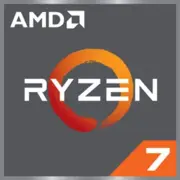AMD Ryzen 7 5700X

AMD Ryzen 7 5700X: A Comprehensive Review of the Processor for Gamers and Professionals
April 2025
Key Features: Architecture and Performance
The AMD Ryzen 7 5700X processor, released in 2022, remains a popular choice in 2025 due to its balance of price and performance. Built on the Zen 3 architecture (codename Vermeer), it utilizes TSMC's 7nm FinFET process technology, ensuring high energy efficiency with a TDP of just 65 watts.
Key Specifications:
- 8 cores and 16 threads — perfect for multitasking.
- 32 MB L3 cache — speeds up performance for resource-intensive applications.
- Base clock: 3.4 GHz / Max: 4.6 GHz — optimized for gaming and work tasks.
- Geekbench 6: 2116 (Single-Core) / 9715 (Multi-Core) — performance comparable to the Intel Core i7-12700K in single-threaded scenarios.
Zen 3 Features:
- Improved IPC (up to a 19% gain compared to Zen 2).
- Precision Boost 2 technology for automatic overclocking.
- Support for PCIe 4.0 (relevant for fast NVMe drives and graphics cards).
Compatible Motherboards: Sockets and Chipsets
The Ryzen 7 5700X uses the AM4 socket, which AMD has supported up until 2025. This allows for a wide selection of motherboards, including budget and premium options.
Recommended Chipsets:
1. B550 — the optimal choice for most users.
- Examples: MSI B550 Tomahawk ($130), ASUS ROG Strix B550-F Gaming ($160).
- Support for PCIe 4.0, memory overclocking, 2-3 M.2 slots.
2. X570 — for enthusiasts.
- Example: Gigabyte X570 Aorus Elite ($200).
- Improved VRM cooling, more USB 3.2 Gen 2 ports.
Important:
- Motherboards with A520 or B450 chipsets may require a BIOS update.
- Avoid cheap models with the A320 chipset — they do not support overclocking or PCIe 4.0.
Supported Memory: DDR4 or DDR5?
The Ryzen 7 5700X works only with DDR4, which in 2025 may be considered a disadvantage compared to processors with DDR5. However, this lowers the overall build cost, as DDR4 remains affordable.
Memory Recommendations:
- Optimal Frequency: DDR4-3200 or DDR4-3600 (with CL16 timings).
- Examples: Corsair Vengeance LPX 32GB (2x16GB) DDR4-3600 ($80), G.Skill Trident Z Neo ($90).
- For overclocking: check the motherboard's QVL list.
Power Supply: How Many Watts Do You Need?
With a TDP of 65W, the Ryzen 7 5700X is one of the "coolest" 8-core processors. However, the power supply wattage depends on the graphics card.
Tips:
- For systems with an NVIDIA RTX 4070 GPU: 650W (e.g., EVGA 650 G5 ($90)).
- With RTX 4080 or Radeon RX 7900 XT: 750-850W (Seasonic Focus GX-750 ($120)).
- If using integrated graphics (but the 5700X doesn't have it!), 450W will suffice.
Pros and Cons of the AMD Ryzen 7 5700X
Pros:
1. Energy Efficiency: 65W TDP compared to 105-125W from competitors.
2. Price: $220 (as of April 2025) compared to $300-350 for the Ryzen 7 5800X3D.
3. Compatibility: Supports AM4 motherboards after a BIOS update.
Cons:
1. No DDR5 or PCIe 5.0 — not suitable for future upgrades.
2. Lacks integrated graphics — requires a discrete graphics card.
Use Cases: Who is This Processor For?
1. Gaming:
- Pairing it with an RTX 4070 Ti delivers 120+ FPS at 1440p (Cyberpunk 2077, Alan Wake 2).
- Lags behind the Ryzen 7 7800X3D in cache-sensitive games but is $150 cheaper.
2. Work Tasks:
- Video editing in Premiere Pro: rendering a 4K project takes 12-15 minutes.
- 3D modeling in Blender: performance level akin to Intel Core i5-13600K.
3. Multimedia and Streaming:
- NVIDIA NVENC + 8 cores are enough for smooth streaming at 1080p60 without lag.
Comparison with Competitors
1. Intel Core i7-12700K ($280):
- Better for multi-threaded tasks (12 cores), but 125W TDP.
- Requires expensive motherboards with LGA 1700 socket.
2. Ryzen 7 5800X ($250):
+ Clock speed up to 4.7 GHz.
– 105W TDP, runs hotter.
3. Ryzen 5 7600X ($230):
+ Support for DDR5 and PCIe 5.0.
– Only 6 cores — performs worse in rendering.
Practical Assembly Tips
1. Cooling:
- Budget: DeepCool AK400 ($35).
- Optimal: Noctua NH-U12S ($70).
2. BIOS:
- For B450/X470 boards, update the firmware to the version supporting Zen 3.
3. Memory:
- Don’t skimp — low-quality modules will hurt performance.
Final Verdict: Who Should Consider the Ryzen 7 5700X?
This processor is an excellent choice for:
- Gamers who want to save on the CPU to invest more in their graphics card.
- Freelancers (video editing, design, programming) who value the balance of price and multi-threading.
- Owners of AM4 motherboards looking to upgrade without replacing their motherboard or memory.
Reasons to avoid it:
- If you plan to switch to DDR5 or PCIe 5.0.
- For tasks requiring 12+ cores (e.g., rendering complex 3D scenes).
In 2025, the Ryzen 7 5700X remains a "dark horse" — it may not be the newest, but it offers reliability and value for those not chasing the top-tier hardware.
Basic
CPU Specifications
Memory Specifications
GPU Specifications
Miscellaneous
Benchmarks
Compared to Other CPU
Share in social media
Or Link To Us
<a href="https://cputronic.com/en/cpu/amd-ryzen-7-5700x" target="_blank">AMD Ryzen 7 5700X</a>